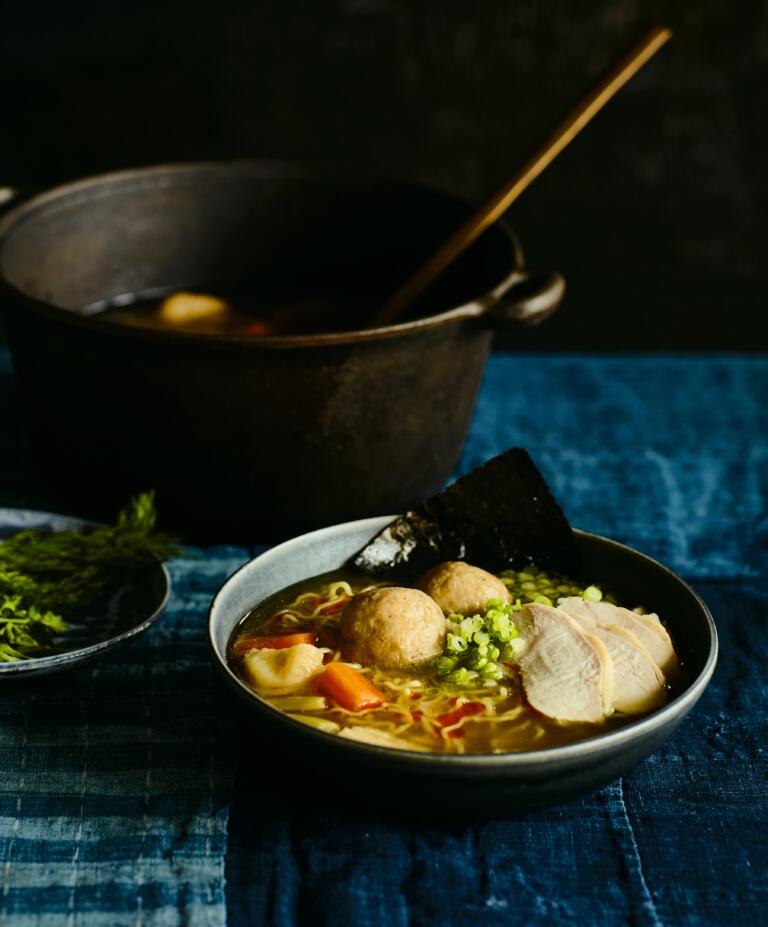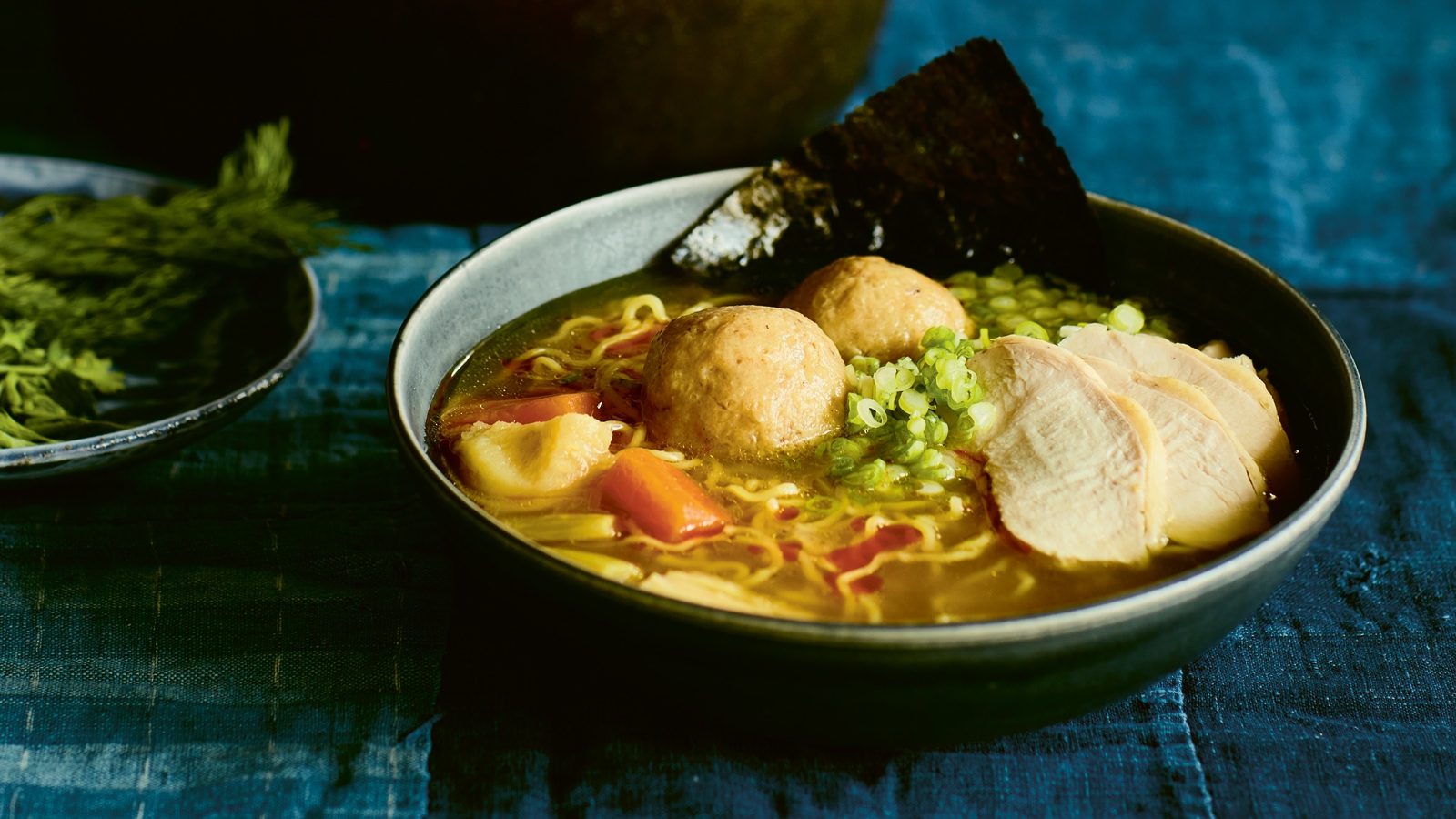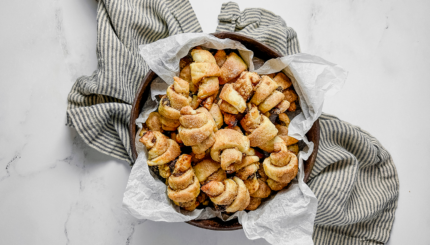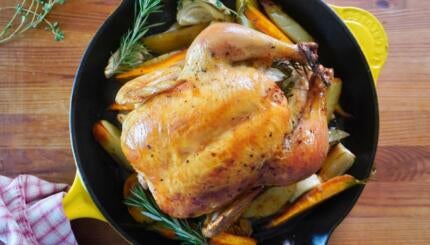This recipe is reprinted with permission from “Love Japan: Recipes from our Japanese American Kitchen” by Sawako Okochi and Aaron Israel; with Gabriella Gershenson, copyright © 2023. Photographs copyright © 2023 by Yuki Sugiura. Published by Ten Speed Press, an imprint of Penguin Random House.

Matzah Ball Ramen
A love letter to Japanese and Jewish cuisine in one delicious bowl.
- Total Time: 5 hours
- Yield: 4-6 servings
Ingredients
For the chicken soup:
- 1 whole chicken (4 pounds)
- 3 Tbsp + 1 tsp kosher salt
- 4 quarts water
- 1 (6-inch) square kombu
- 1 bay leaf
- 1-inch piece fresh ginger
For the matzah balls:
- ½ cup matzah meal
- 1½ tsp baking powder
- ¼ tsp kosher salt
- 2 Tbsp canola oil, melted duck fat or melted chicken fat
- 2 eggs
- 1 tsp water
To finish:
- 1 bunch fresh dill, rinsed
- 1 bunch curly parsley, rinsed
- 1 carrot, peeled and cut into 1-inch pieces
- 1 small parsnip, peeled and cut into 1-inch pieces
- 2 celery stalks, cut into 1-inch pieces
- 1 yellow onion, quartered
- kosher salt
- 1 pound fresh ramen noodles
- 2 scallions, thinly sliced
- chili oil (optional), such as S&B brand
- 4–6 (4×2-inch) pieces of nori, for garnish
Instructions
- To make the soup: Remove the breast meat from the chicken with the skin intact and place on a plate. To remove the chicken breasts, place the chicken on a cutting board breast side up, with the legs facing you. Starting at the breastbone, slice downward, running your knife along the bone, slightly left of the center of the breast. When you hit the rib cage, angle the knife away toward the left breast, and slice the meat off the bone, pulling the breast away from the rib cage with your free hand. Keep slicing and pulling until you have detached the breast meat. Repeat with the other breast.
- Season both sides of each breast with 1 tsp salt and refrigerate. Remove the chicken legs by dislocating the thigh bones at the joint where they meet the back. Slice along the joint to detach.
- In a large stockpot with a lid, combine the chicken carcass and legs (but not the breasts) and the water. Bring to a boil over high heat, taking care to skim any foam or other impurities that rise to the surface. Reduce the heat to a low simmer. Add the kombu, bay leaf, ginger and the remaining 3 Tbsp salt. Cover and cook until the meat is tender and comes off the bone easily, 1½ hours. Check periodically to be sure it’s only gently simmering, adjusting the heat if necessary.
- Meanwhile, to start the matzah balls: In a small bowl, combine the matzah meal, baking powder and salt and thoroughly combine using a fork or your hands. Add the canola oil and combine well, making sure the fat is evenly distributed. In another small bowl, beat the eggs with 1 tsp water.
- Pour the eggs into the matzah meal mixture and mix well. Put a layer of plastic wrap directly on the surface of the matzah ball batter and refrigerate for at least 30 minutes.
- After the chicken has been simmering for 1½ hours, use tongs and a slotted spoon to carefully fish the chicken legs out of the stock. When they’re cool enough to handle, pick the meat off the bones, put in a container, cover and refrigerate until ready to use. Return the bones to the pot, cover, and continue to gently simmer for another 1½ hours.
- To finish: Uncover the stock and add the dill and parsley. Add the breasts to the simmering stock, cover, and simmer until cooked through, 12-16 minutes. Carefully remove and check for doneness using a metal skewer or the tip of a knife inserted into the thickest part of the breast. If it’s cooked, the skewer should be very warm to the touch. If it’s not, poach for a few more minutes. Transfer the breasts to a plate to cool. Strain the stock through a sieve into another large pot. (Discard the bones and aromatics.)
- Bring a large pot of water to a boil over high heat for the noodles. Add the carrot, parsnip, celery and onion to the stock. Bring to a boil over high heat.
- Remove the matzah ball batter from the refrigerator. Wet your hands to prevent sticking, then roll 8-10 balls the size of large marbles (about 1 heaping Tbsp), squeezing once or twice to lightly compress. Drop in the boiling pot of soup. Cover, then reduce the heat to medium, with the soup at a rolling boil. Cook until the matzah balls have about tripled in size, are soft on the outside and a little spongy in the center, about 30 minutes. Cut one open to test; if they’re undercooked, the center will be dark and dense.
- Add the leg meat to the soup to warm through. Season with salt, anywhere from 1-3 tsp. (The broth needs to be salty because the noodles will absorb the seasoning from the soup.) Thinly slice the chicken breasts and set aside. Drop the ramen noodles into the boiling water and stir. Cook according to the package directions. Drain and distribute among serving bowls.
- Ladle the broth over the ramen in the bowls, along with some vegetables, the leg meat and one or two matzah balls. Lay a few slices of the breast into each bowl, sprinkle with the scallions and chili oil (if using), and stand a piece of nori along the edge. Serve immediately.
- Prep Time: 1 hour
- Cook Time: 4 hours
- Category: Dinner
- Method: Soup
- Cuisine: Ashkenazi
The Nosher celebrates the traditions and recipes that have brought Jews together for centuries. Donate today to keep The Nosher's stories and recipes accessible to all.



